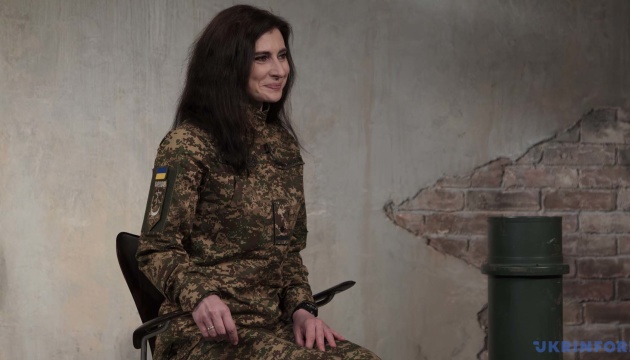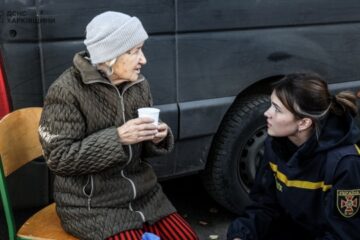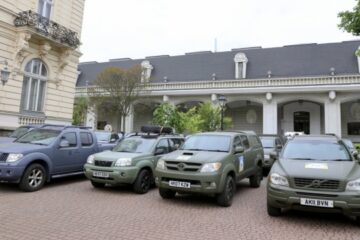Maryna “Mujahed” Ryazantseva was a family physician before changing her white coat for military uniform – currently, she leads a medical company within the Bureviy Brigade. She met the war in Eastern Ukraine, in her native town of Debaltseve back in 2014. The hospital Maryna was employed with ended up on the front line. Civilian illnesses changed for shrapnel wounds, and medical office for a place to save soldier lives under fire. That was when she embarked on her path as a military doctor.
In 2022, doctor Ryazantseva was wounded by enemy fire, but she did not stop evacuating her injured comrades from the battlefield, putting her life at risk. She was awarded with a Presidential medal honoring this heroic feat.
In this interview of the series “Victory Commanders”, Ukrinform talked to doctor Ryazantseba about her experience serving on the front line, the war through the eyes of a doctor, how military health care system works on the front line, women at war, as well as about the best and worst days in her life.
[embedded content]
– You are originally from the Donetsk region, where the events of 2014 caught you. How did it influence your decision to stand up for the defense of Ukraine?
– Since the hostilities broke up in Eastern Ukraine in 2014, not only my life has changed. The life of all of the country has changed. The civilian population, to which I belonged until 2014, was not preparing for war, did not understand that a real war had started up. Because no one can plan, or even imagine, that tomorrow your city will be bombarded with Grad rockets, with cruise and ballistic missiles, that your house will be destroyed, that you yourself and your loved ones will be injured, or there will be deaths among the civilian population. This cannot be prepared for. But when it all started, it became a reality, unfortunately.
– How did you act at that time?
– At that time, I was employed as a family physician in a civilian clinic. And since the clinic found itself in a very close vicinity to the front line, wounded casualties began to be brought there from the front line. Consequently, we had to administer emergency medical care and conduct surgical interventions, using the clinic as a base hospital.
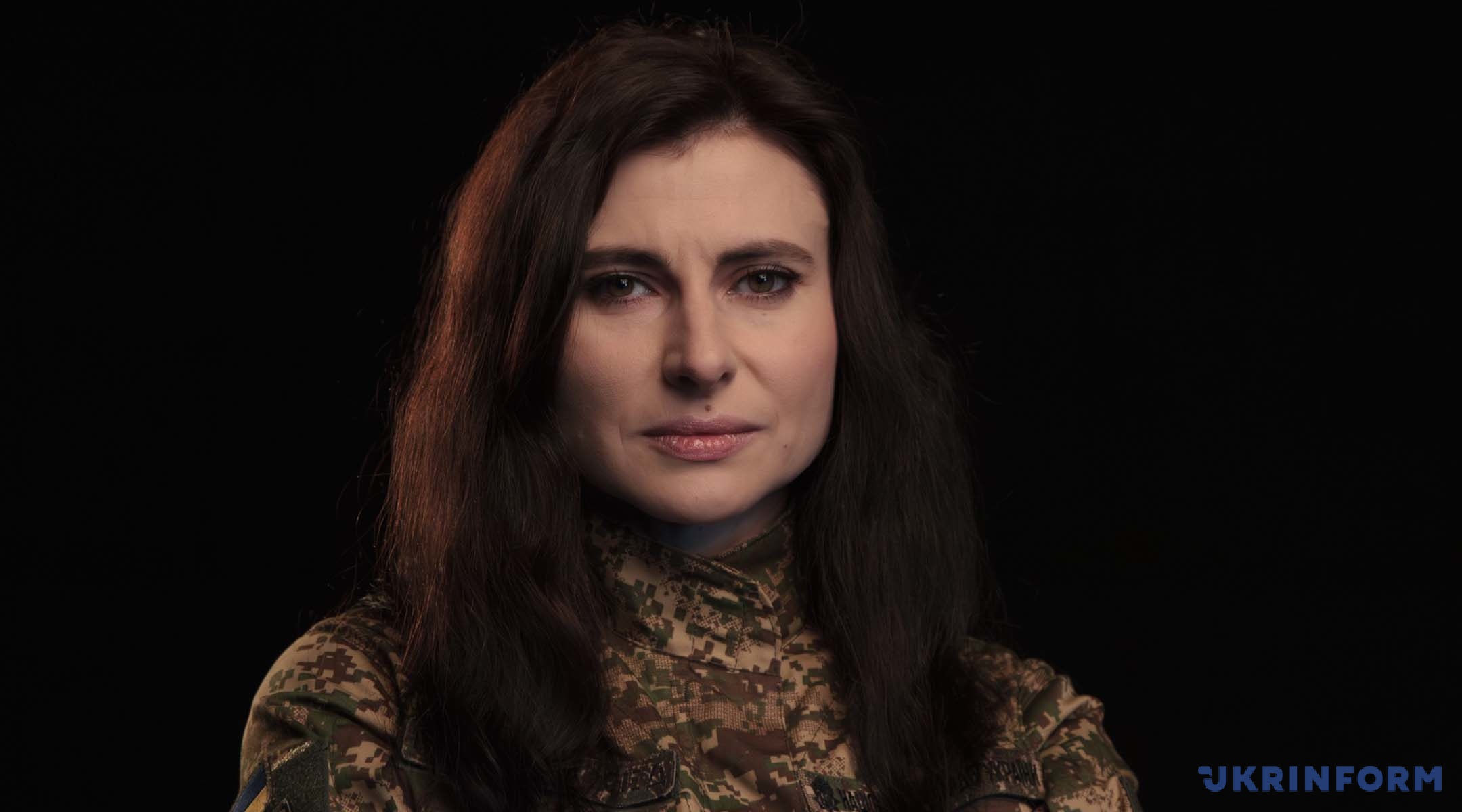
– You have a university degree in medicine, but, as I understand it from your words, you did not imagine that you would ever have to use this knowledge in combat conditions. And when first wounded casualties began arriving, there were, perhaps, the injuries typical for time of peace, also.
– Absolutely yes. I have a university degree in medicine, but I would not say that I was completely unprepared for such a development of events. Because at the university where I studied, a specialized military training course was mandatory. That is, I already had an initial idea of such events at that time, albeit more of a theoretical nature. But this knowledge helped me a lot and helps me to this day.
– So, you just started doing your job at some point. Did you have any fears, doubts?
– Fear is always there with everyone. And it is absolutely normal, because it is a manifestation of the instinct of self-preservation. Absolutely everyone has fears. Another thing is how to relate to this fear. Because fear can actually be controlled by willpower, by making certain efforts. But when there is work, you are no longer attentive to fear and other feelings. You understand that there is a patient who needs urgent care, urgent decisions from you, and this pushes fear to the background.
– A certain category of people from the East succumbed to the moods of the so-called “Russian world”, why not you?
– I can’t even imagine how it could be otherwise. Because I was born in Ukraine, spoke Ukrainian, my parents, my parents’ parents spoke Ukrainian. It was precisely when in Donetsk that I studied in Ukrainian, was learning in Ukrainian for university degree, and I swore an oath of allegiance to the people of Ukraine. And, basically, I didn’t even think of the possibility of me changing my vector.
– I just want to clarify: we know that there is combat medicine, where emergency care is administered, but you perform broader work, right?
– That’s right. Emergency care, first aid, is provided by soldiers to each other, or by a combat medic. This may be a person without a medical background, but the one who has received some amount of specialized training. And military medics and military doctors provide care at the following stages.
— What is the worst and best day in your life as a military doctor?
– The worst day is definitely when the war began, when it became clear that the point of no return had come and there was no way back, that we were already in a state of war and it would continue. And the best day, I think, is ahead – when we will celebrate victory.
– Where did the full-scale invasion meet you?
– The full-fledge invasion met me when I was at home, in Kyiv. At the end of 2021, my contract with the National Guard of Ukraine expired and I returned to civilian medicine. I worked for a civilian hospital, was getting ready for a shift, getting ready for work. And at some point, early in the morning, I heard powerful explosions nearby that simply shook the house. And then I realized what had begun.
– How did you act, given that you already had experience since 2014?
– Yes, indeed. I looked on the news, watched through certain news channels, where it was said that a full-scale war had begun and the enemy was advancing through the territory of the Kyiv region. It did not come as a big surprise to me, because I understood that the enemy actually wanted all of Ukraine. That it will not limit itself to some pieces of territory, but wants to destroy and capture all of Ukraine. Therefore, it was just a matter of time. And at that moment I packed up my things and headed towards my military unit. Accordingly, I joined the army ranks later on the same day and commenced my duties.
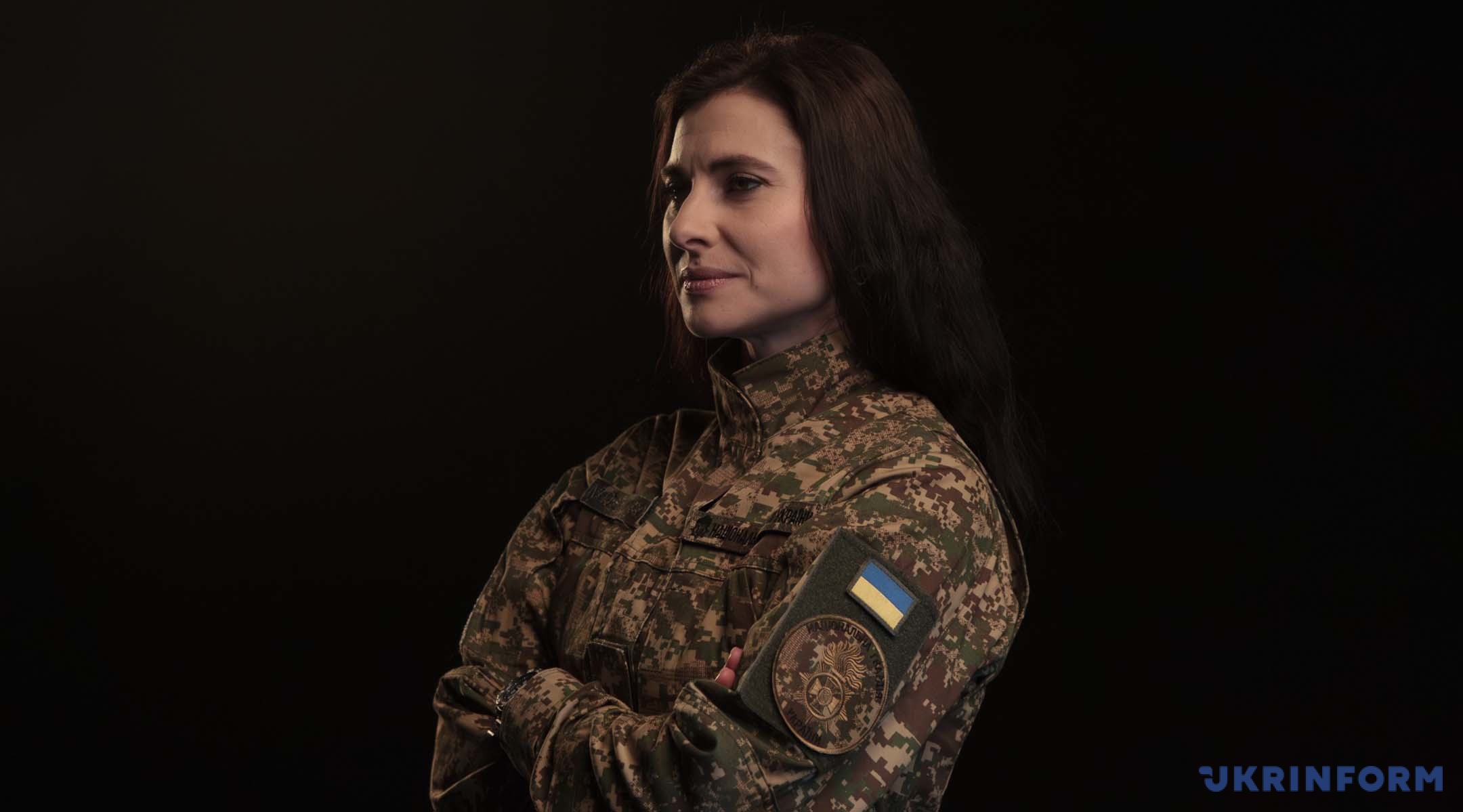
– We know that you received a Presidential award for your deeds in Horenka. Would you tell us about this episode in your life?
– This episode took place during hostilities in the Kyiv region. On March 3, [2022], my unit received an order to reinforce the positions of the armed forces, which at that time were located where fierce hostilities were raging. But we did not have time to reach these positions, because we came under heavy enemy fire. This fire was adjusted from drones, which were constantly circling above our heads. And our movement towards the positions stalled. As soon as there was a moment in between the attacks, between the hits, we had to start evacuating, collecting and “sorting” the wounded casualties, which we did, actually. Since my medical vehicle at that time was badly damaged by explosions, we had to use the vehicles that were completely unfitted for this role. Fortunately, one of our armored vehicles remained operational, so we used it for evacuation purposes. But the vehicle wasn’t spacious or very fast, so we had to return to the zone of fire exposure several times to pick up all the wounded casualties. We succeeded. This operation lasted until early morning, but all the wounded received first aid and were then taken to a hospital.
– You sustained a wound during this operation, your life was in danger, but you continued saving others, you did not retreat. What were your feelings and thoughts at that moment?
– My feelings and thoughts were focused on my work only. That is, I understood that I had an indefinite number of wounded casualties, they all needed to be found, they all needed to be provided with first aid, and the “sorting” and evacuation of these wounded was organized. And taking into account the fact that there were wounded of varying degrees of severity, it was critical to sort out who needed emergency care, evacuation, and who could wait a little while until we returned for the other wounded. And this absorbed all my attention. That’s to say, I didn’t pay any attention to my own condition, to my unpleasant feelings. Fortunately, everything passed almost without bad consequences, and it came without new wounds during my subsequent trips and work episodes.
– Were there any other rescue operations in your experience that you remember the best?
– There are a lot of such stories. And every rescue operation, every patient who was saved, who was provided with timely care and recovered, is a kind of miracle. There was a situation where we had several wounded casualties to care for at one and the same time. This happened in a forested area on the line of contact. The forest was full of landmines, and the soldiers who entered the position suffered several severe injuries, traumatic amputations. And since everything happened at night hours, there was no way to send an evacuation group there. So the patients themselves had to provide care to themselves and to their comrades. The operation was guided simply by radio, until early morning, when evacuation groups were able to be sent there to search and evacuate these soldiers.
– On which of the fronts did you serve during the full-scale invasion? Is there one that you consider particularly difficult in your experience?
– During the full-scale invasion, in addition to the battles for Kyiv, I had to serve at the Donetsk, Luhansk, and Kharkiv fronts. And since the situation is changing very sharply and quickly, I would not single out any of them. They are all quite difficult and sometimes too difficult.
– How did you come from being a family doctor to being in command of a medical company? What was this path like for you?
– It was a very interesting path, because from the beginning I had no plans for a career in the military. I liked my job. I really love my patients, my work. But, as we have said already, the war radically changed these plans. As Woody Allen once said, if memory serves me, if you want to make God laugh, tell me about your plans. And so it happened. All my plans somehow moved to the back burner, and I had to apply my skills and professional abilities serving in the ranks of the National Guard. But this is a very interesting experience. I do not regret choosing this path. It is also a responsible job, but extremely interesting at that. And what motivates me is that I understand how useful I can be serving in the ranks of the National Guard, that I can be utmostly helpful to the military personnel who are in need of it.
– What is your typical day at work, if it is typical, of course?
— We never have typical days, actually. Because the medical company is a separate unit, very specific one, which, in addition to performing general military tasks, also conducts medical and diagnostic work. I am burdened with responsibility for both my personnel and patients. Moreover, patients are the first line of responsibility, because it is necessary to create comfortable conditions for their stay, to ensure their earliest recovery, ensure they are provided with adequate treatment. I need to know everything about each patient: about problems, wounds, subsequent rehabilitation needs, the time of discharge from hospital and return to service.
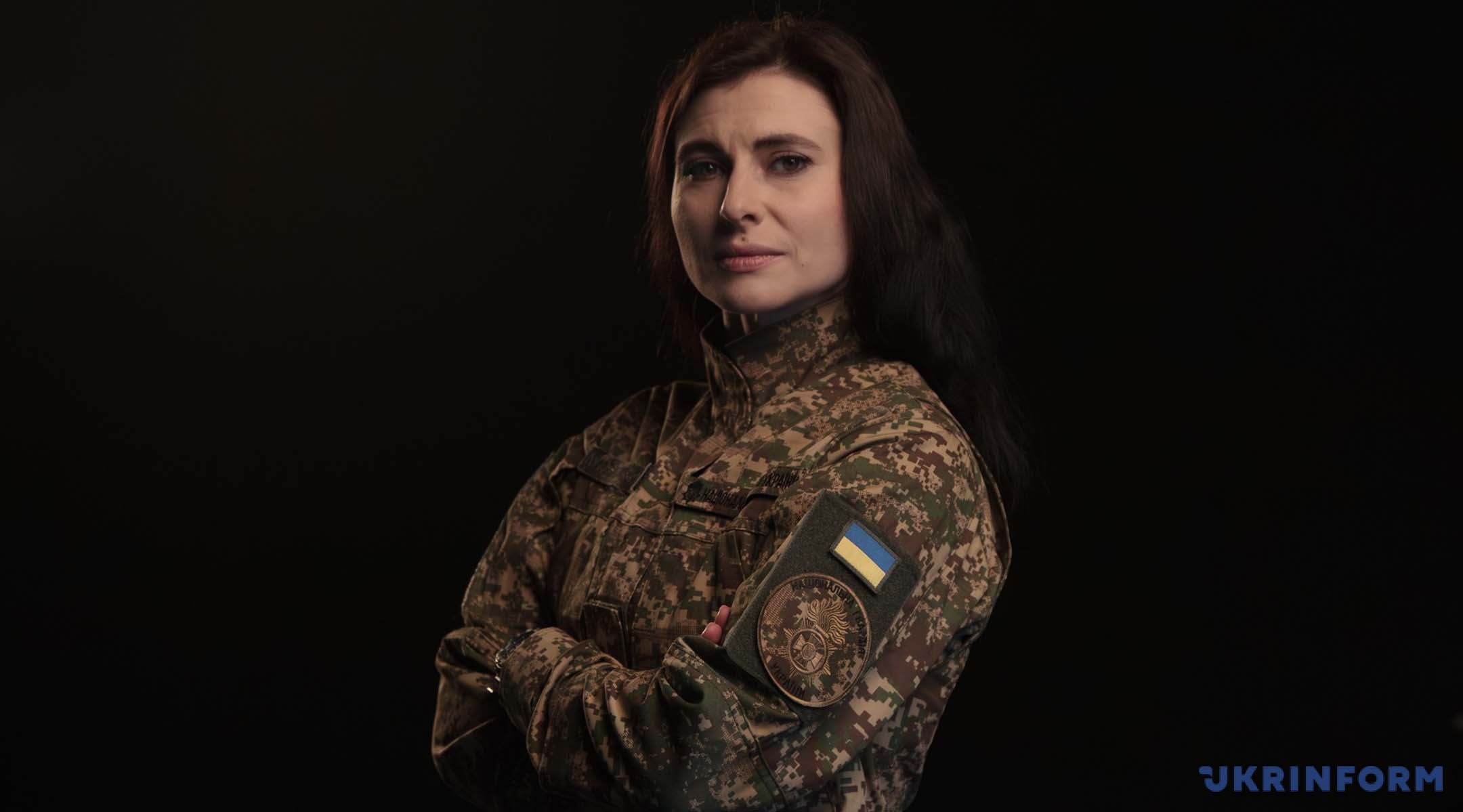
– How do you organize this work, because we understand that you have to work in extremely difficult conditions?
– The work is organized depending on the battlefield situation, on the number of wounded patients, on the severity of the wounds being dealt with. In other words, this can be either providing care at a specific location, or we need to focus more on evacuation operations or on work in the hospital. It depends on the number of wounded patients, on the type of the wounds prevailing at any particular time.
– You have to deal also with non-standard situations. What can surprise you in the fourth year of the full-scale war?
– For me, the war began not four years ago, but in 2014. But at the time the war began in the East, the situation was the same. That is, the enemy was destroying cities, killing civilians, demolishing infrastructure. What is happening now on a larger scale was happening in the East back then. I think there are no such situations that can surprise me now.
– Would you tell us about how military health care is provided on the battlefield? Are there enough resources, and what are the most urgent requirements?
– Military health care system has now improved incredibly compared to what I remember it was like many years ago when the war began. And the provision of medicines is now much better, as is the provision of supplies for providing emergency care, for fitting personal first-aid kits. Production lines have been put in place, and continuous supplies to troops in the field have been set on track. Put another way, I do not see any significant problems with the supplies of essential medical products. But some problems remain in place, such as the lack of armored medical evacuation vehicles, specialized armored vehicles, I mean, in units. The ones that can evacuate wounded patients from the forward edge of the battle area. Battlefield units are in need of specific means of protection – electronic warfare systems, mobile electronic warfare systems carried on vehicles, both medical and non-medical in particular. It is extremely difficult without them now.
– How does the evacuation take place, what is of critical importance in the first minutes, hours?
– The primary evacuation takes place from the forward edge of the battlefield. Where there is a wounded patient, he must be evacuated as quickly as possible. Speed plays a vital role. This is an element, an evacuation case, that is, combat medics work there, delivering casualties to the evacuation point, where qualified medical personnel on a medical vehicle can pick up the patient and deliver him either to the FSG (Forward Surgical Group of the Armed Forces Medical Force, – ed.), or to the hospital.
– Were you personally involved in evacuation operations?
– Yes, indeed.
– And what is your task now?
– I organize all the elements, provide a coordination among them so that there are no failures, coordinate evacuation team departures. Where there is a need to reinforce a brigade, then yes, of course, I leave as part of this brigade.
– Could you tell us about your experience evacuating wounded patients from the battlefield? Rumors have it that you ‘pulled out’ a man about two meters tall on your back.
– It is not entirely correct to say I had pulled him out on my back, because there are either stretchers or other additional means provided for patients of any weight or in any condition. Needless to say, I did not have to work alone, that is, I had assistants who actively assisted me in this effort, and if you are aware of all these aspects, this is absolutely no problem.
– What are the biggest challenges you are facing now as a medical company leader?
– The fact is that commander of a medical company, like any other, is a position of very high responsibility. That is, the commander is fully responsible for the provision and training of personnel, for ensuring continuous medical and diagnostic work within the company and beyond. As might be expected, it is every day that we encounter situations that require urgent solutions.
– What is your assessment of how the military health care system in the Armed Forces is developing?
– Medicine has taken a leap forward. Due to the fact that we have grown numbers of patients, we need to gain experience working with them, experience with patient treatment and rehabilitation. And these are not only wounded patients. Obviously enough, there are also somatic diseases that are exacerbated or commonly developed in the aftermath of combat operations, the psychological state of patients and other disorders, which also need to be treated, and this all should be done in a comprehensive way. Our military health care system is currently at a fairly high level, and, I think, it will soon reach the level where we will be able to share our experience with others.
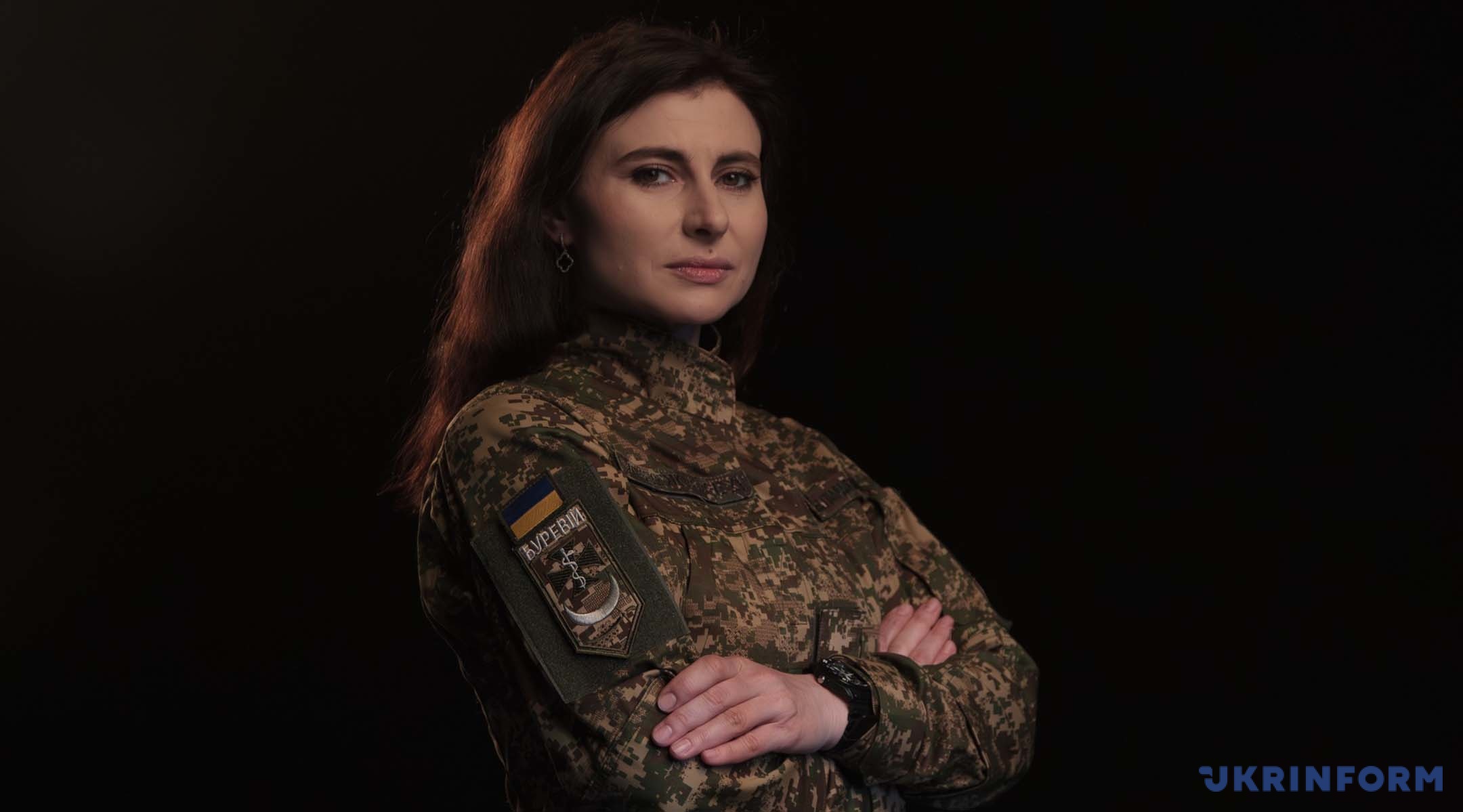
– What about human resources, are there enough personnel or do you have to recruit?
– Personnel are always in short supply, and given the fact that, currently, we have a limited number of medical workers, the situation is very difficult. We can train, for example, combat medics on our own or with the help of specialist instructors, but have no opportunity to train professional doctors, regrettably. We understand that it takes 5-6 years to train a doctor, plus additional 2–3 years of internship training. What makes things even worse is that fewer people are now ready and willing to join army ranks.
– Are your doors open to all wishing so?
– Yes, of course, I have a very friendly team, well-placed and properly organized. I think, a place will be found for everyone who chooses to join our ranks, and all-round support will be provided so that newcomers feel comfortable in this work, among our team.
– How are combat medics being trained?
– We have instructors in tactical medicine who provide training for combat medics. These are the people who know how to teach, that is, they not just have a certain set of skills, but can professionally teach them to other people, and this training can take from several days to several months, depending on the purpose of the training being provided. In other words, we are training a service member capable of an extended range of roles, who can provide both first aid and medical care. Alternatively, it can be a first aid course, after which this service member will be able to provide care both for himself and for fellow soldiers.
– What cannot be done when providing first aid?
– First, under no circumstances must you panic, because panic affects logical thinking, the ability to observe, to draw conclusions. That said, panic is strictly prohibited. Secondly, one must not allow any delays to occur, because we understand that we are saving the patient’s time, and the faster we respond, the more chances of survival the patient gets. And, needless to say, each decision a doctor makes regarding a patient is fateful, no one has the right to do wrong. When a doctor is working on a patient, especially a patient in critical, life-threatening condition, s/he needs to work quickly, make decisions quickly, and these must be right decisions, because patient’s life and health depend on it.
Well, I would like to make a separate mention of the first principle of medicine, not only military one: “Do no harm!”. That’s to say, everything a doctor does must be done to benefit the patient, and must precisely suit the patient’s condition and the need for specific manipulations.
– Ground robotic platform for evacuation of casualties have already become available. Have you used them?
– I have not had to work with robotic platforms yet. I watched videos of such platforms being developed and tested. I think this is a promising and appropriate element, and we will deploy it extensively in the future, should we have an opportunity.
– Can a robot fully replace a human being in this?
– I don’t think it can fully replace a human being, because medicine is an applied practice, it cannot be studied from textbooks, from theory alone. Robots, machines can provide care within a limited range of standardized roles. But we understand that there are many different non-standard situations that can occur, and it is preferrable that a human is involved in resolving this situation, because a human has the ability to more accurately assess the casualty’s condition and perform certain first aid manipulations immediately on sight, and also at follow-up later stages.
– The provision of high-quality tourniquets is a thorny issue. What is your assessment of the quality of tourniquets produced in Ukraine?
— It so happened that we first started working with American-made tourniquets. But, fortunately, our manufacturers have learnt how to make tourniquets that are almost identical in terms of quality to U.S.-made counterparts. There are several domestic manufacturers that are worthy of being praised, and there is no doubt that these tourniquets are of high quality, we use such tourniquets and provide them to servicemen as part of personal first aid kits. As far as I know, there have never been any problems or complaints with them.
– My next question is about the training of medical recruits: how important is it, have you had to provide additional training to new recruits?
– Training is important at every stage of it, because medicine is a profession where you need to develop yourself constantly: improve your skills every day, study some theory, acquire practical skills. Therefore, regardless of whether it is a new recruit or a serviceman who has been in the ranks for some time, training should still continue.
– I want to know if you’ve ever heard that women have no place in war? And in general, what role do you think women are playing in today’s Ukrainian army?
– Regretfully, I heard this being said during my service, albeit not too often. I believe that this opinion is totally wrong. We, women, prove the opposite practically every day and every minute, because female service members are currently fighting on an equal footing with their male counterparts. Moreover, there are lots of military specialties where women perform no worse, or even better than men. Naturally, a woman, by virtue of physiology, is not that strong physically as a man is, nor does she have the endurance a man has, but our war is a technological one. Simply put, it is no longer focused on human resources alone; we are fighting not so much physically as, one might say, by our brains.
– When you hear talk about Ukraine having to cede some territories, how do you respond to it?
– This information emerges quite sporadically, and I would first find out where it is originating from and for what purpose. We are in a war for survival, the enemy is destroying territories, cities, infrastructure, killing civilians, does not stop short of bombarding hospitals, children’s institutions: schools, kindergartens… This all in order to just grab some piece of territory. This is being done to destroy the Ukrainian nation to the point where it will never be able to recover. Therefore, ceding some territories to the enemy or even talking about it is not our way.
– What will Ukraine’s victory mean to you?
– Victory is a return to Ukraine’s borders as they were in 1991, but that’s not all. We are facing a very insidious, ambitious and emotional enemy who cannot be left alone, because it is not going to leave us alone either. And, I think, our victory will not be ultimate until we get the enemy to stop its aspirations and efforts to seize our territory, to seize Ukraine, and for this it must be neutralized to the point where it is unable to so. That is, we will have to work a little more to destroy the military infrastructure of the neighboring country, which is the aggressor country.
– Why is “Mujahideen” your alias?
– I have had it since 2015, my colleagues from my unit gave it to me. It was like in ancient Cossack times, when comrades gave alias names to newcomers, instead of the latter devising alias names for themselves. That’s what happened, actually: they decided that this alias would suit me. Besides, “mujahid” is for “champion” in Ukrainian: champion for justice, for the truth.
– War for you is…
– War for me is a disaster, and not only for me, but for the Ukrainian people as a whole.
– What can you never forgive?
– I can’t forgive the enemy and I will never be able to forgive, ever. The question is not about revenge, but about the enemy’s aspiration to conquer and capture a neighboring country, a groundless aspiration.
– What thought do you wake up with?
– A new day, new work, new opportunities.
– Can one person change the course of history?
– It’s quite possible, but it has to be at some very opportune moment.
– What is your biggest fear in life?
– A failure to save a patient’s life or lose someone from my comrades.
– What is the greatest reward for you?
– Gratitude from those you save. When a patient simply says “thank you,” it’s the best reward you can get at work, the best feeling you can ever get.
– What’s the first thing you’ll do after Ukraine wins?
– I’ll return home.
Interviewed by Diana Slavinska
Photo: Kyrylo Chubotin
The interview can be watched in full here
Source: Maryna “Mujahed” Ryazantseva, Commander of Medical Company within Bureviy Brigade

